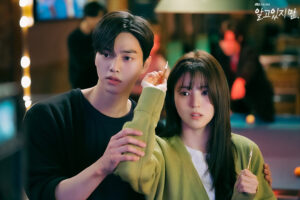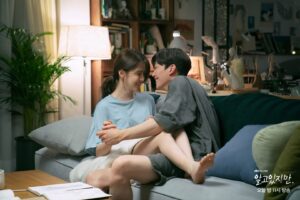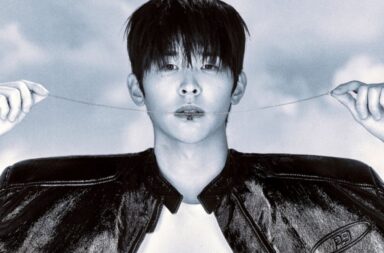
From the description, JTBC’s Nevertheless, looks to be another cute but ultimately unmemorable romance series–the spurned in love yet still romantic Na-bi (Han So-hee) finds herself drawn to Jae-eon (Song Kang), who likes flirting and casual relationships, but has no interest in anything serious, while her first crush Do-hyeok (Chae Jong-hyeop) reappears after a chance encounter and pursues her. There are side couples and exes, and every beat that you would expect to show up in a series like this does. Yet Nevertheless, is utterly spectacular. What should be another run-of-the-mill webtoon-based drama is elevated beyond measure due its devotion to excellence in two key elements: artistry and realism.
The best way to describe the aesthetic is that the production staff were under the impression they were making an arthouse film, and nobody told them otherwise. This fits the subject matter, as all the characters are art students, and gives us a shorthand into how they perceive the world. The first five minutes make it clear that Nevertheless, is not the typical rom-com. We are shown Na-bi’s previous relationship from start to end, yet her ex is always off camera. Times when they’re happy are shot in rack focus and warm lighting to provide a sense of softness; worse times are in harsher conditions, but the things that cause her pain are just not shown until we have another person’s perspective. This lighting shorthand carries through the entire series. Happiness is warm, soft, and comfortable. Unhappiness is normal to harsh, giving everything an unpleasant edge. And things the characters don’t want to deal with literally won’t appear on camera.
The sound design is also startlingly unique. The cornerstone of it is not a soundtrack or instrumental motifs, but silence. Nevertheless, is willing to allow quiet to dominate the screen, to let the audience simmer in the same tense noiselessness as the characters. We share the discomfort and the confusion because there is no non-diegetic cue to tell us what’s going on. The emphasis on quiet also gives the occasions where the soundtrack appears far greater impact, giving extra weight to the moments that might otherwise read as fairly innocuous. Overall, the artistry elevates Nevertheless, into something achingly beautiful.
Of course, elevation can only go so far without good source material, which brings us to the other defining attribute of Nevertheless,: its realism. In the modern media landscape, “Realism” is often used as a dog whistle for dark, gritty, depressing stories, so calling a romance–especially a youth-targeted series–realistic is a bit odd. But “realistic” here is the actual meaning of feeling real.

Characters in this series don’t act like drama characters; they act like people. They react poorly to stress, succumb to peer pressure and doubt, and have their own problems outside of love, and that is why it’s so compelling. The audience cannot take it for granted that Na-bi and Jae-eon’s relationship will work out, that Sol (Lee Ho-jung) and Ji-wan (Yoon Seo-ah) will confess their feelings, that Bit-na (Yang Hye-ji)and Gyu-hyun (Kim Min-gwi) will overcome their issues, because Nevertheless, is not running on drama rules. It’s grounded and genuine, with each character bringing a flawed humanity to the typical drama archetypes.
This realism also colors the plot, utilizing themes of love that reflect the real world rather than an idealized drama setting. One of the big themes is that there are many ways to date and find love, and very few of them are wrong. Jae-eon and Bit-na both engage in casual sex at the start, and are not demonized because they are honest about it with their partners. Sol, Ji-wan, and Gyu-hyun do not date due to unrequited feelings and a preference for something more serious, and they are also framed positively. Na-bi’s decision to enter into a casual fling with Jae-eon is seen as her breaking under the loneliness brought on by her previous heartbreak. This decision is not a great idea, but is an understandable and still moral one.
Nevertheless, also explores how just because nobody is wrong does not mean everybody is right. Na-bi and Jae-eon and Bit-na and Gyu-hyun both break up the first time because one person is more invested. Ending the relationship is the mature response, but it was still a foreseeable consequence that both pairs disregarded. Then there’s Do-hyeok, Na-bi’s first love. When they reconnect, he confesses to her and continues to pine for her, which is fine. Less fine is that when she tells him she’s not in a place to date, he keeps pursuing her and tells her he’ll give up when he believes she’s not interested… when she already said no.

This brings us back to the theme that drives the core love story of Na-bi and Jae-eon: date the person who you think fits you better. Because of Jae-eon’s playboy reputation, the art students discourage Na-bi from being with him and push her towards Do-hyeok, the sweet childhood friend who cooks. The kicker is that Jae-eon and Na-bi are great together. They just click, understanding each other without words, always attuned to the other’s presence and feelings. He provides belief against her insecurities, she brings comfort for his isolation. They are caught in each other’s orbits, and it is only the influence of outside forces that can tear them apart.
One of the more subtle elements of the writing is the juxtaposition of Jae-eon with Na-bi’s ex. He is only shown a handful of times, but he’s controlling, judgemental, and violates her by displaying a statue of her in flagrante without her knowledge, let alone her consent. Jae-eon, on the other hand, is caring, attentive, wanting to make her happy rather than flatter his ego. He also obfuscates the fact that he had seen her before they met and developed feelings for her, so as to not burden her with his feelings. Consistently, his only motivation with her is to make Na-bi happy, and she returns that.
Indeed, by the last episode, all of the couples of Nevertheless, can be described in much the same way, because that is the ultimate point of this series: love should make you happy. Most dramas let characters get caught up in the chaos of getting together, but here the goal is always the same: find someone who you like to be around. The audience is able to keep rooting for Na-bi and Jae-eon despite the obstacles, because we know what they look like together: soft focus, warm lights, and the only times these two smile. The side couples follow different romantic paths, but all end in that bubble of comfortable bliss. Outside issues can be dealt with, but that baseline contentment with your partner is vital, because if you don’t like each other, why bother?

Even Nabi’s closing voiceover, in which she states that she knows Jae-eon will hurt her one day, seems to align with this. While the first time she accepted this relationship was going to crash and burn, her view the second time is more mature. Now, she understands that pain is a side effect of love, that highs are impossible without lows, but if someone makes you happier than you would be alone, then it’s worth it.
Nevertheless, is a masterpiece. It speaks honestly about love, relationships, romance, personal needs versus group opinions, and the purpose of it all. It may appear to be one of many rom-coms, but it proves that when the execution is artful and honest, those cliches we all know are simply a foundation for something wonderful.
(Images via JTBC. YouTube.)



